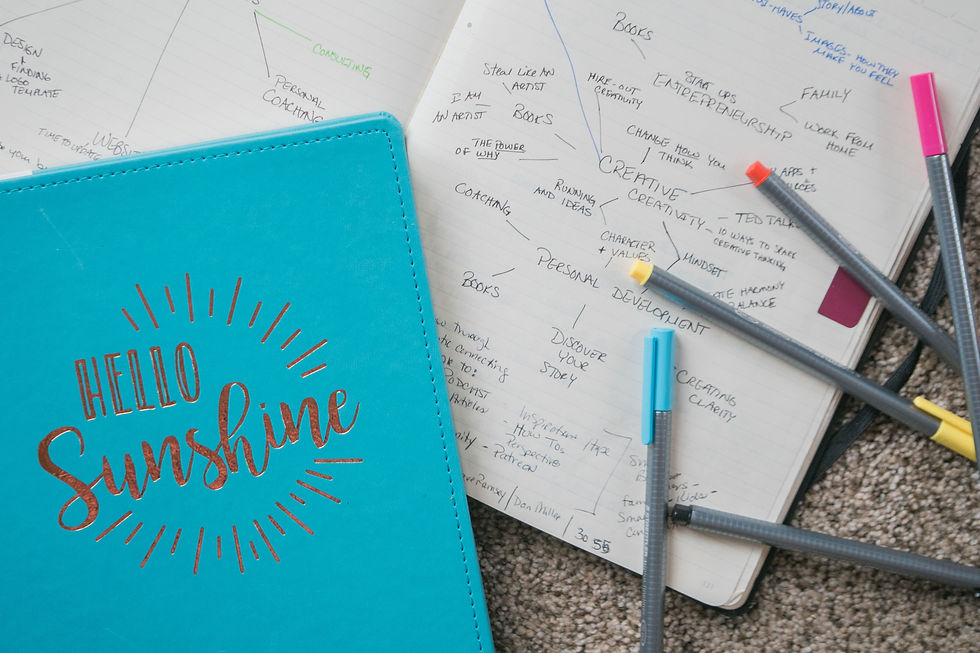What you think is what you get: How to change old, patterned thinking
- Tiffany Skidmore
- Feb 11, 2020
- 4 min read
Updated: Feb 14, 2020

The way we talk to ourselves determines the results we get in our lives.
The interesting thing is that most of the thoughts we think and the things we say about and to ourselves are on default. We aren't even aware of what we are repeating.
According to a 2005 Science Foundation Study, humans think an average of 12,000–60,000 thoughts each day. Of those, 80% are negative and 95% are repeated from the day before. Talk about a perpetual hamster wheel!
I’m in a new relationship as of the start of 2020. It’s great. Like really, really great. And yet, as things have progressed, I’ve had a couple of freak outs where I’ve felt a flood of strong emotion (largely fear) and a desire to distance myself despite feeling the most compatibility and potential I’ve felt with a partner.
Earlier in my life, I would’ve just grabbed onto these thoughts and feelings as truth; goddess knows they feel true in the moment. But, now, I took the time to journal, to get clear about the root thoughts that were driving my freak outs. It’s been fascinating, and sometimes deeply uncomfortable.
I've been a recovering perfectionist for five years, and working deeply with self-compassion and mindfulness practices for three. My relationship with myself was at an all-time high. And yet...
When I set an intention to eavesdrop on my brain about this relationship, I was dismayed to hear what it was saying:
You’ll always be on the outskirts.
You’ll never be a top priority.
You’re not enough.
You’re always going to end up alone.
Strangely, when I paused and questioned the truth of these thoughts, they didn’t give me the green light of authenticity. There was no real evidence to support them. They were just old patterned thoughts and feelings that felt really convincing.
Here's the thing, we all have programs running on default in the background—thoughts our brains put into the subconscious and turned into beliefs because
It was repeated so many times around or to us and/or
It is something it believes will keep us alive (via safety, love, belonging).
Some of our default programs are so outdated. They served us at one point in our lives, like when we were children, but now actually hold us back.
The great news is that we can change the thoughts and programs we have running in our brains. It may not seem likely, because right now those thoughts have had so much air time that they feel like truth to us. However, neuroscience has shown without a doubt the capacity of the brain to learn and rewire at any age. It just takes four steps.
Notice. Take time each day to become more and more aware of what goes on in your head. Journal and get all your thoughts out on paper. When a stressful moment comes up, pause or reflect after the fact and take note of what you tell yourself in challenge. Record these thoughts and note patterns.
Decide. How do you feel about the default thoughts and programs you are currently running? Do they support where you want to go? Do you like the results you're getting? This is your choice now that you are aware -- to keep what you've got or to upgrade your hardware.
Edit. Stay mindful. When old thoughts come up, catch them and edit them to something more aligned to where you want to be. For example, I'm always late, becomes, I'm committed to figuring out a system so I'm always on time. Or, I'm stressed and want potato chips, becomes, I always choose the most nourishing choice for my health and body.
Reprogram. This is the fun one! The subconscious/default programs are learned by the brain through repetition. So to choose new thoughts to think on purpose, it's important to have them on repeat throughout your day. You can record a voice memo and listen to them, write them daily, read them on sticky notes at your house or at work, say them out loud, and think them. The more you practice, the more natural they become.
This process of rewiring your brain is the incredibly important work of repairing relationship with yourself.
Of learning to have your own back real hard.
Of choosing to step into more contentment and confidence now, regardless of your life circumstances.
More spaciousness and ease is available to you now without needing to change the facts of your life. Going through a hard time in life is tough enough without layering painful thoughts about ourselves on top of it
Using this process allows me to learn about myself, see my brain more clearly, and begin to choose new thoughts that helped me show up differently in this relationship, shifting my old, predictable, frustrating patterns. I’ve chosen new thoughts to think on purpose like:
I am always finding the reasons this relationship will work long term.
I love making my relationship a priority, and my partner does too.
I trust in our ability to figure things out with time.
This is just an overview of the process, but if you’re interested, here’s how to start today...
Begin to notice how you talk to yourself.
What does your brain tell you when you look in the mirror?
When you make a mistake?
When you have a stressful day at work?
Get to know yourself and your programs.
Be curious, instead of judgmental about what you find.
Notice and name, isn't that interesting that I....
P.S. If you are interested about this, get in touch! I offer a free hour call for new clients, and this work is my absolute favorite because of how life-shifting it can be!






Comments